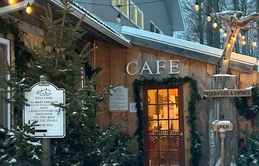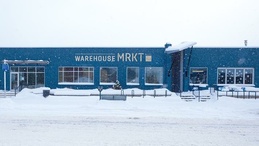
Growing Up Queer
Three LGBTQ+ students share their experiences with finding a safe and supportive community
By Quinn De Vecchi | May 31, 2025
The month of my thirteenth birthday was when I returned from my first LGBTQ+ friendly summer camp. On the plane ride to Florida, overlooking the turn from Los Angeles, I silently cried. I was leaving a place where I knew everyone understood what I was going through. Five minutes into my crying session, the flight attendant passed me a wad of paper napkins. I was still drying my eyes by the time we landed.
I had been sad to come back to Florida after being in such an accepting place like Los Angeles. When I met with my mother at the airport, the first thing I did wasn’t hug her or tell her how my trip was. It was to take off my backpack and unclip the gay flag I had pinned on the side.
That had been the first time I had expressed fear of my gender and sexuality to my mother. And it was the first time I had ever been scared to live in Florida.
When I moved to Michigan to start studying at Interlochen Arts Academy (IAA) for writing, there was a stark change in atmosphere from Hallandale, Florida. It felt like I had suddenly been transported into a dream world where everyone accepted me and so many people were like me.
Hatred by the Numbers
Right now in the United States, there are over 575 anti-LGBTQ+ bills, according to the American Civil Liberties Union (ACLU), which has been actively striving for equal treatment of queer people since 2003.
The ACLU writes on their website, “While more states every year work to pass laws to protect LGBTQ people, state legislatures are advancing bills that target transgender people, limit local protections, and allow the use of religion to discriminate…LGBTQ people have a right to live in safety, to thrive, and to be treated with dignity.”
Queer teens are often hounded by their families and the public, and depending on where they live, they fear for their lives. The Gay & Lesbian Alliance Against Defamation (GLAAD) hosts the Anti-LGBTQ Extremism Reporting Tracker (ALERT), which monitors any and all anti-LGBTQ+ happenings in the U.S.
The ALERT Desk in just 2022 tracked over 1,850 anti-LGBTQ incidents in the U.S. and the District of Columbia, which span “450+ protests, 330+ propaganda drops, 320+ acts of vandalism, 200+ bomb & mass shooting threats, 130+ assaults, and 45+ cases of arson, resulting in 161 injuries and 21 deaths.”
In relation, the Trevor Project, a nonprofit organization focused on crisis and suicide prevention on LGBTQ+ youth, holds the U.S. National Survey on the Mental Health of LGBTQ+ Young People. The survey is done publicly by queer youth in the U.S. and reviews mental health differences between queer teens and children annually.
In 2024, the Trevor Project reported that at least 45 percent of transgender and nonbinary youth have considered moving to another state “because of LGBTQ+-related politics and laws.” In the same survey, 32 percent of youth said they were harassed because people believed they were LGBTQ+. And 23 percent of queer youth revealed that they had been physically threatened or harmed due to their sexuality or gender expression.
A Place to Belong
LGBTQ+ hate spans the world, but it can be worse in specific areas of the country. Coming to Michigan from Florida was an extreme change for me, but it also made me realize that queer people were treated differently depending on where you were.
To get more information on this, I talked with two of my friends at school who are both part of the LGBTQ+ community.
I first talked with Blondine Moree, a transgender woman from South Carolina. She is a senior at IAA studying creative writing and writes frequently about queer characters and southern life.
“I only came out when I got to boarding school, but I wasn’t unaware [before that],” Moree says. “There was always this underlying feeling of difference that you get as a queer person. I would ask, ‘Why can’t I go to the sleepover with the girls? Why can’t I wear pink?’”
When writing pieces that relate to queerness, Moree mentioned that many of her queer-focused works center on hair and what hair means as a transgender person. Her hair, Moree tells me, “has always been one of the main things I can control as a trans person.”
“My father would always talk about sin. My sister is an evangelical Christian—I could be eating mashed potatoes [during dinner] and then I’d choke out a skin because she was talking about how queer people are all going to be in hell,” Moree says. “It was a world you were forced into.”
That all changed at Interlochen. “But at IAA it’s completely different. Queerness is just a fact of life.” Moree then adds, “When you’re walking around, people don’t look at you as if you’re different. Because you’re not different in the first place.”
Moree has been accepted to New York University and will be attending in the fall. She plans on majoring in creative writing.
Hope and Healing
I then decided to talk to another friend of mine who was raised in the Midwest, who has chosen to stay anonymous. She identifies as bisexual.
“Where I’m from, being queer felt like a crime,” she says. “I grew up absolutely terrified of admitting it to anyone, even myself. Some days I was so upset about it, I got physically sick.”
But again, finding the right community made a big difference. “Being [at IAA] has really healed something in me. Michigan doesn’t really relate to my queerness so much as being away from my home does—it’s less about where I am and more about where I’m not.
“It took me a few months of being here to admit to myself what being queer actually meant: not a symptom of some issue that I could explain away, or that would fade out when I was happier, but a piece of my identity as constant and undeniable as my love for my art.”
In my experience, IAA strives to create an inclusive community for all youth. While students will still experience the hate against LGBTQ+ people as we navigate the world, there is hope in knowing that many places are waiting with open arms.
To learn more about helping LGBTQ+ youth, you can visit ACLU’s website at aclu.org, GLAAD’s at glaad.org, and the Trevor Project at thetrevorproject.org.
Trending

Welcoming the Winter Solstice: Rituals & Events for the Shortest Day of the Year
With the winter solstice quickly approaching, it’s hard not to notice how dark each day feels. Astronomically, this is… Read More >>
Camp Greilick Now Open!
It’s been a long road for the century-old Camp Greilick, which, after several dormant years, was acquired by Grand Tra… Read More >>
Men and Ugly Sweaters
Those two things don’t always go together, but on Dec. 19, you’ll see both out and about in Petoskey and Harbor … Read More >>


